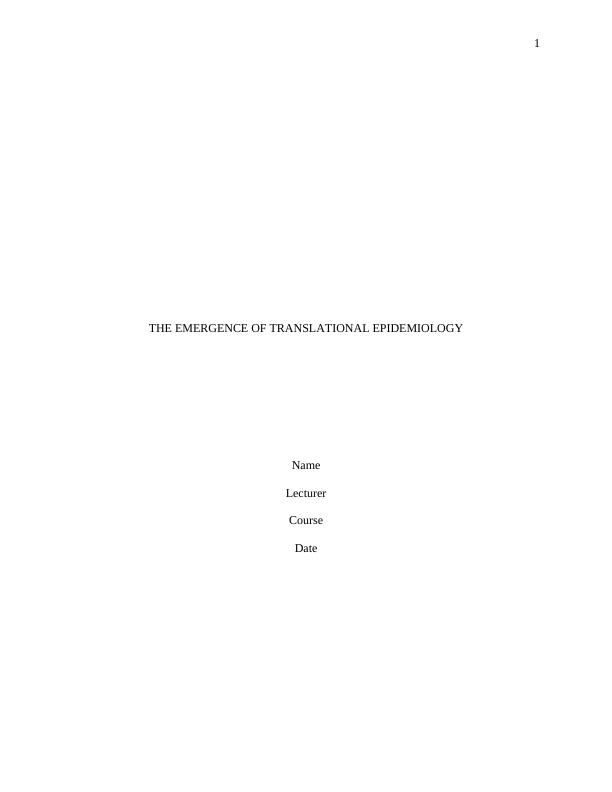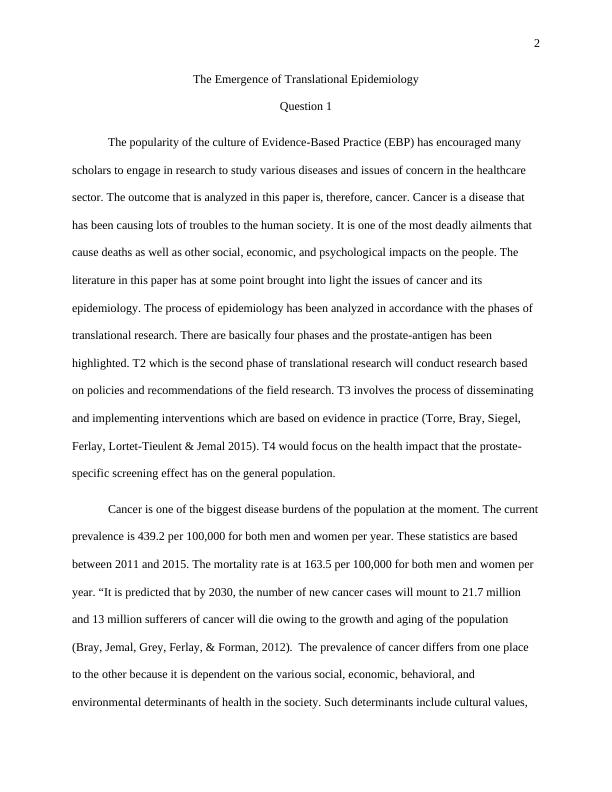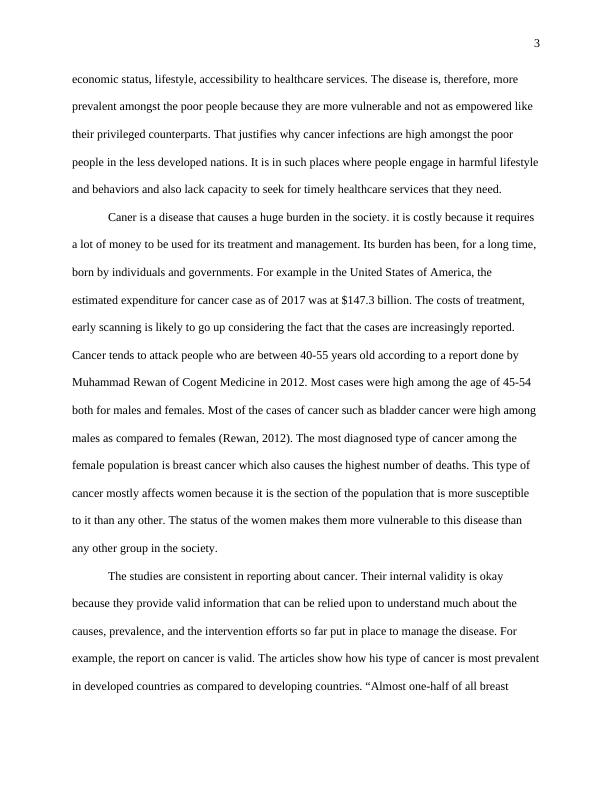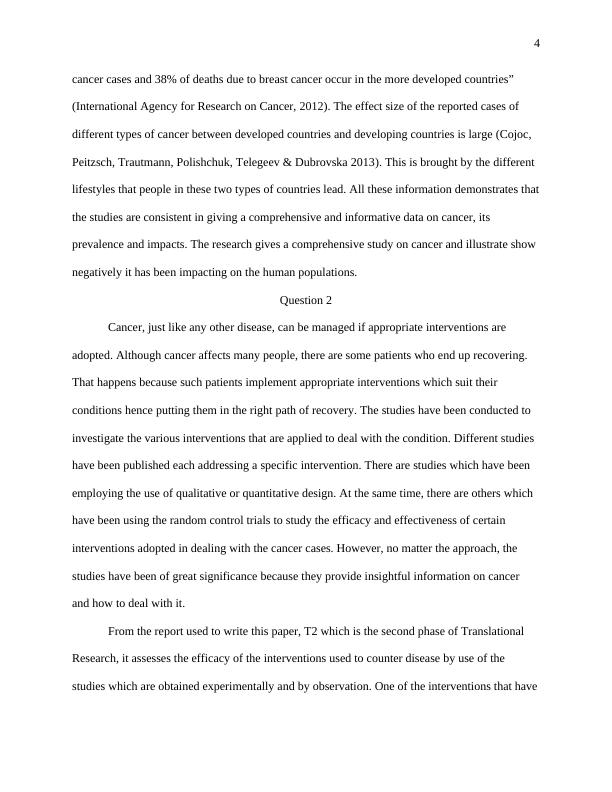The Emergence of Translational Epidemiology
Added on 2023-06-11
11 Pages3409 Words260 Views
1
THE EMERGENCE OF TRANSLATIONAL EPIDEMIOLOGY
Name
Lecturer
Course
Date
THE EMERGENCE OF TRANSLATIONAL EPIDEMIOLOGY
Name
Lecturer
Course
Date

2
The Emergence of Translational Epidemiology
Question 1
The popularity of the culture of Evidence-Based Practice (EBP) has encouraged many
scholars to engage in research to study various diseases and issues of concern in the healthcare
sector. The outcome that is analyzed in this paper is, therefore, cancer. Cancer is a disease that
has been causing lots of troubles to the human society. It is one of the most deadly ailments that
cause deaths as well as other social, economic, and psychological impacts on the people. The
literature in this paper has at some point brought into light the issues of cancer and its
epidemiology. The process of epidemiology has been analyzed in accordance with the phases of
translational research. There are basically four phases and the prostate-antigen has been
highlighted. T2 which is the second phase of translational research will conduct research based
on policies and recommendations of the field research. T3 involves the process of disseminating
and implementing interventions which are based on evidence in practice (Torre, Bray, Siegel,
Ferlay, Lortet-Tieulent & Jemal 2015). T4 would focus on the health impact that the prostate-
specific screening effect has on the general population.
Cancer is one of the biggest disease burdens of the population at the moment. The current
prevalence is 439.2 per 100,000 for both men and women per year. These statistics are based
between 2011 and 2015. The mortality rate is at 163.5 per 100,000 for both men and women per
year. “It is predicted that by 2030, the number of new cancer cases will mount to 21.7 million
and 13 million sufferers of cancer will die owing to the growth and aging of the population
(Bray, Jemal, Grey, Ferlay, & Forman, 2012). The prevalence of cancer differs from one place
to the other because it is dependent on the various social, economic, behavioral, and
environmental determinants of health in the society. Such determinants include cultural values,
The Emergence of Translational Epidemiology
Question 1
The popularity of the culture of Evidence-Based Practice (EBP) has encouraged many
scholars to engage in research to study various diseases and issues of concern in the healthcare
sector. The outcome that is analyzed in this paper is, therefore, cancer. Cancer is a disease that
has been causing lots of troubles to the human society. It is one of the most deadly ailments that
cause deaths as well as other social, economic, and psychological impacts on the people. The
literature in this paper has at some point brought into light the issues of cancer and its
epidemiology. The process of epidemiology has been analyzed in accordance with the phases of
translational research. There are basically four phases and the prostate-antigen has been
highlighted. T2 which is the second phase of translational research will conduct research based
on policies and recommendations of the field research. T3 involves the process of disseminating
and implementing interventions which are based on evidence in practice (Torre, Bray, Siegel,
Ferlay, Lortet-Tieulent & Jemal 2015). T4 would focus on the health impact that the prostate-
specific screening effect has on the general population.
Cancer is one of the biggest disease burdens of the population at the moment. The current
prevalence is 439.2 per 100,000 for both men and women per year. These statistics are based
between 2011 and 2015. The mortality rate is at 163.5 per 100,000 for both men and women per
year. “It is predicted that by 2030, the number of new cancer cases will mount to 21.7 million
and 13 million sufferers of cancer will die owing to the growth and aging of the population
(Bray, Jemal, Grey, Ferlay, & Forman, 2012). The prevalence of cancer differs from one place
to the other because it is dependent on the various social, economic, behavioral, and
environmental determinants of health in the society. Such determinants include cultural values,

3
economic status, lifestyle, accessibility to healthcare services. The disease is, therefore, more
prevalent amongst the poor people because they are more vulnerable and not as empowered like
their privileged counterparts. That justifies why cancer infections are high amongst the poor
people in the less developed nations. It is in such places where people engage in harmful lifestyle
and behaviors and also lack capacity to seek for timely healthcare services that they need.
Caner is a disease that causes a huge burden in the society. it is costly because it requires
a lot of money to be used for its treatment and management. Its burden has been, for a long time,
born by individuals and governments. For example in the United States of America, the
estimated expenditure for cancer case as of 2017 was at $147.3 billion. The costs of treatment,
early scanning is likely to go up considering the fact that the cases are increasingly reported.
Cancer tends to attack people who are between 40-55 years old according to a report done by
Muhammad Rewan of Cogent Medicine in 2012. Most cases were high among the age of 45-54
both for males and females. Most of the cases of cancer such as bladder cancer were high among
males as compared to females (Rewan, 2012). The most diagnosed type of cancer among the
female population is breast cancer which also causes the highest number of deaths. This type of
cancer mostly affects women because it is the section of the population that is more susceptible
to it than any other. The status of the women makes them more vulnerable to this disease than
any other group in the society.
The studies are consistent in reporting about cancer. Their internal validity is okay
because they provide valid information that can be relied upon to understand much about the
causes, prevalence, and the intervention efforts so far put in place to manage the disease. For
example, the report on cancer is valid. The articles show how his type of cancer is most prevalent
in developed countries as compared to developing countries. “Almost one-half of all breast
economic status, lifestyle, accessibility to healthcare services. The disease is, therefore, more
prevalent amongst the poor people because they are more vulnerable and not as empowered like
their privileged counterparts. That justifies why cancer infections are high amongst the poor
people in the less developed nations. It is in such places where people engage in harmful lifestyle
and behaviors and also lack capacity to seek for timely healthcare services that they need.
Caner is a disease that causes a huge burden in the society. it is costly because it requires
a lot of money to be used for its treatment and management. Its burden has been, for a long time,
born by individuals and governments. For example in the United States of America, the
estimated expenditure for cancer case as of 2017 was at $147.3 billion. The costs of treatment,
early scanning is likely to go up considering the fact that the cases are increasingly reported.
Cancer tends to attack people who are between 40-55 years old according to a report done by
Muhammad Rewan of Cogent Medicine in 2012. Most cases were high among the age of 45-54
both for males and females. Most of the cases of cancer such as bladder cancer were high among
males as compared to females (Rewan, 2012). The most diagnosed type of cancer among the
female population is breast cancer which also causes the highest number of deaths. This type of
cancer mostly affects women because it is the section of the population that is more susceptible
to it than any other. The status of the women makes them more vulnerable to this disease than
any other group in the society.
The studies are consistent in reporting about cancer. Their internal validity is okay
because they provide valid information that can be relied upon to understand much about the
causes, prevalence, and the intervention efforts so far put in place to manage the disease. For
example, the report on cancer is valid. The articles show how his type of cancer is most prevalent
in developed countries as compared to developing countries. “Almost one-half of all breast

4
cancer cases and 38% of deaths due to breast cancer occur in the more developed countries”
(International Agency for Research on Cancer, 2012). The effect size of the reported cases of
different types of cancer between developed countries and developing countries is large (Cojoc,
Peitzsch, Trautmann, Polishchuk, Telegeev & Dubrovska 2013). This is brought by the different
lifestyles that people in these two types of countries lead. All these information demonstrates that
the studies are consistent in giving a comprehensive and informative data on cancer, its
prevalence and impacts. The research gives a comprehensive study on cancer and illustrate show
negatively it has been impacting on the human populations.
Question 2
Cancer, just like any other disease, can be managed if appropriate interventions are
adopted. Although cancer affects many people, there are some patients who end up recovering.
That happens because such patients implement appropriate interventions which suit their
conditions hence putting them in the right path of recovery. The studies have been conducted to
investigate the various interventions that are applied to deal with the condition. Different studies
have been published each addressing a specific intervention. There are studies which have been
employing the use of qualitative or quantitative design. At the same time, there are others which
have been using the random control trials to study the efficacy and effectiveness of certain
interventions adopted in dealing with the cancer cases. However, no matter the approach, the
studies have been of great significance because they provide insightful information on cancer
and how to deal with it.
From the report used to write this paper, T2 which is the second phase of Translational
Research, it assesses the efficacy of the interventions used to counter disease by use of the
studies which are obtained experimentally and by observation. One of the interventions that have
cancer cases and 38% of deaths due to breast cancer occur in the more developed countries”
(International Agency for Research on Cancer, 2012). The effect size of the reported cases of
different types of cancer between developed countries and developing countries is large (Cojoc,
Peitzsch, Trautmann, Polishchuk, Telegeev & Dubrovska 2013). This is brought by the different
lifestyles that people in these two types of countries lead. All these information demonstrates that
the studies are consistent in giving a comprehensive and informative data on cancer, its
prevalence and impacts. The research gives a comprehensive study on cancer and illustrate show
negatively it has been impacting on the human populations.
Question 2
Cancer, just like any other disease, can be managed if appropriate interventions are
adopted. Although cancer affects many people, there are some patients who end up recovering.
That happens because such patients implement appropriate interventions which suit their
conditions hence putting them in the right path of recovery. The studies have been conducted to
investigate the various interventions that are applied to deal with the condition. Different studies
have been published each addressing a specific intervention. There are studies which have been
employing the use of qualitative or quantitative design. At the same time, there are others which
have been using the random control trials to study the efficacy and effectiveness of certain
interventions adopted in dealing with the cancer cases. However, no matter the approach, the
studies have been of great significance because they provide insightful information on cancer
and how to deal with it.
From the report used to write this paper, T2 which is the second phase of Translational
Research, it assesses the efficacy of the interventions used to counter disease by use of the
studies which are obtained experimentally and by observation. One of the interventions that have

End of preview
Want to access all the pages? Upload your documents or become a member.
Related Documents
Health Disparity | Cancer Assignmentlg...
|6
|1281
|16
Epidemiological Triad United States Article 2022lg...
|5
|461
|25
Cancer in Australia: Mortality, Common Cancers, Risk Factors, and Health Promotion Strategieslg...
|8
|2459
|235
(PDF) Inequalities in healthlg...
|5
|755
|20
A Critique of the Literature on Lung Cancer in Australialg...
|8
|2602
|185
Health Inequalities Among Women in KSA: A Systematic Reviewlg...
|14
|3046
|191
